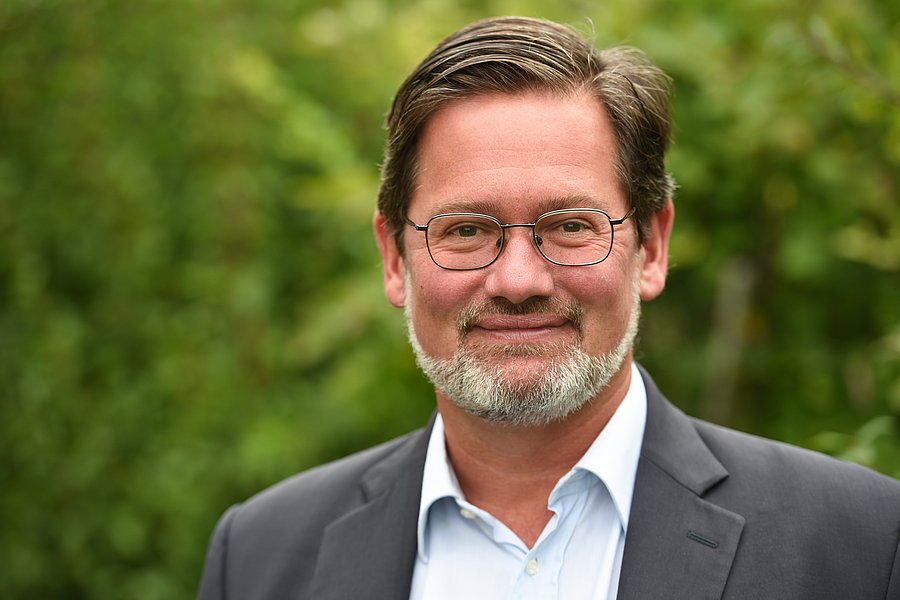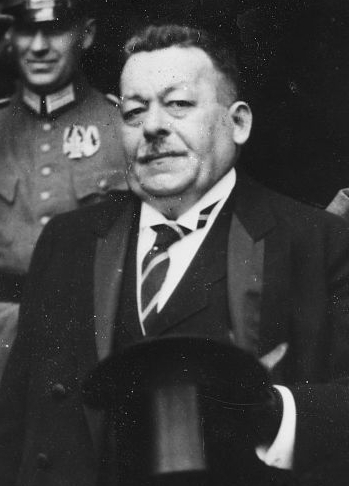
Reich President Friedrich Ebert dies
PD Dr Arne Karsten / History
Photo: Sebastian Jarych
A man of balance
Dr Arne Karsten on Friedrich Ebert, the first President of the Weimar Republic
Friedrich Ebert, the first President of the Weimar Republic, died in Berlin on 28 February 1925 at the age of just 54. Who was this man?
Karsten : Friedrich Ebert was first and foremost a social climber, a man who came from very humble beginnings, was the son of a master tailor and became the head of state of the German Reich. A triumph, but one that also concealed a great deal of tragedy, as the background to this was the world-shaking, destructive effects of the First World War, the collapse of the old social order in Germany, revolution, civil war-like conditions and an internal tension in the Weimar Republic, which was largely responsible for Friedrich Ebert's early death.
He learnt the trade of saddler, then went travelling from 1888 to 1891 and also came to Elberfeld and Remscheid. What did he do here?
Karsten : Those were the classic years of apprenticeship and travelling that tradesmen had to complete as part of their training. A time of freedom and independence, but often also of material hardship. Friedrich Ebert experienced unemployment first-hand, hired out here and there to work for master craftsmen, and these temporary jobs were usually poorly paid.
In 1889, he joined the SAP, which became the SPD a year later. His work for the party led to a permanent position as editor of the Bremen Bürgerzeitung, which he left after a year to open an inn. That was quite an unsettled lifestyle, wasn't it?
Karsten : A very unsteady lifestyle, and also a life story that was typical of the times to a certain extent, characterised by uncertainty and upheaval. We lived in the age of industrialisation. The craft industry was in crisis. A master saddler had to compete with mass-produced products from large industrial companies. Everywhere craftsmen were getting into difficulties, everywhere craftsmen were looking for ways out of the permanent crisis. And Ebert's life was typical in that he tried his hand at various professions, including in the party establishment, in the political organisation of the working class. Ebert was even a member of parliament for Elberfeld in the Reichstag in 1912 and then campaigned for the region.
He also established himself as a political speaker, especially in Bremen, where he lived. His speeches were considered well-researched, sharp-tongued and ironic. Did that also pave the way for his political career?
Karsten : Being a good speaker is of course always an advantage in times of developing democracy, it allows you to influence the electorate, a trump card that Ebert was able to play.
With Ebert, it was not political work that dominated, but trade union work. How could you recognise that?
Karsten: He was a trade union member himself, he had sought contact with workers' associations from an early age during his apprenticeship and travelling years, knew the needs of the workforce from practical experience and was correspondingly sensitive to the goals of trade union work to improve the situation of the workforce.
After the death of August Bebel in 1913, Ebert succeeded him as party chairman with 433 out of 473 votes. That means approval across the board, doesn't it?
Karsten: Absolutely. At this point, Ebert had made a name for himself both within the party and through his contacts with the trade union and was seen as a man of balance. As in all parties, there were also infighting and factions in the mass organisation of the SPD, and Ebert was excellent at repeatedly creating consensus between these internal party factions.
During the First World War, Ebert was no longer able to unite the party. Why not?
Karsten : The fundamental question for the working class in 1914 was who had priority: the international solidarity of the workers or solidarity with the fatherland? This was the view in the German SPD, as well as in other nations. We have similar debates in France or in England. Before the war, it was said that the workers in Europe would not allow themselves to be chased into the trenches by capital, but that is exactly what happened. The pathos of national need triumphed over labour solidarity. "We will not leave the fatherland alone in its hour of danger." This was the position of the majority socialists, with which Ebert also identified. There was a small wing around Karl Liebknecht that did not want to authorise the war loans that were necessary to finance the war, and this resulted in the fundamental split in the party.
After the war, Ebert sought a parliamentary monarchy. For what reason?
Karsten : Ebert was a convinced monarchist by nature, by conviction. He wanted a constitutional monarchy, a constitutional monarchy; he still recognised that the monarch as head of state had an important, balancing function above the parties. When Max von Baden handed him the chancellorship, he said that he wanted to prevent the social revolution, that he hated revolution like the plague. Ebert was a reformer, not a revolutionary.

Reich President Friedrich Ebert, public domain
Ebert was appointed Reich Chancellor by Prince Max von Baden on 9 November 1918. But that wasn't the official way, was it?
Karsten : There was no official path at the time of the revolution, the Kaiser abdicated, there was a power vacuum. Who was supposed to fill this power vacuum? As we know, the republic was proclaimed twice, by Scheidemann and Liebknecht. This already shows the chaos in which Germany found itself after the abdication of the Kaiser, which came very suddenly, although it had been in the offing.
He put himself at the head of the revolution in order to steer it into parliamentary channels. He did not want Russian conditions under any circumstances, had the Spartacus uprising crushed and pushed for new elections. On 11 February 1919, Ebert became President of the Reich and remained so until his death. What characterised his presidency?
Karsten : On the one hand, on his part, the endeavour to have a balancing effect even in this position, to mitigate the party struggles in Germany, the bitter political disputes and to keep the young democracy capable of winning a majority. On the other hand, from the outside, his presidency was characterised by the polarisation between the parties and the immense hostility from the right and the left. Ebert led around 200 lawsuits against slanderers. You only have to read the writings of Tucholsky, the great left-wing publicist who wrote for the Weltbühne, about Ebert to see how the man was literally torn between the reactionaries who wanted the monarchy back and the revolutionaries for whom the Weimar Republic and the changes that led to it simply did not go far enough, who wanted a social revolution modelled on the Bolshevik model.
Shortly after his death, the Friedrich Ebert Foundation named after him was founded. What is its mission?
Karsten : The Friedrich Ebert Foundation is the party foundation of the SPD. Its declared aim is to support the promotion of the democratic idea in society and to promote it through all kinds of events. The foundation maintains offices in various capitals around the world, offers scholarships, organises conferences and symposia. All of this is part of its mission.

Friedrich Ebert monument on the Hardt in Wuppertal
CC BY 3.0
After 1946, Königstraße in Wuppertal was also renamed Friedrich-Ebert-Straße, which is still called Friedrich-Ebert-Straße today, and there is a memorial stone on the Hardt. But it's not really well known anymore, is it?
Karsten : If I were to ask in my lectures: Who was Friedrich Ebert, I would certainly get very few answers. I have to admit that this has to do with the general disappearance of historical awareness. Knowledge of history is shrinking, history lessons in schools are shrinking in the same way, and a few clichés are still being taught that are needed as a negative foil for the dark past, against which our bright future stands out all the more brilliantly. But as soon as things get more complicated, when it really is about history with all its contradictions, the knowledge disappears. And although Friedrich Ebert is still present as a namesake for squares and streets, fewer and fewer people today know which great personality these streets were named after.
Uwe Blass
PD Dr Arne Karsten (*1969) studied art history, history and philosophy in Göttingen, Rome and Berlin. From 2001 to 2009, he was a research assistant at the Institute for Art and Visual History at Humboldt University Berlin. He has been teaching as a junior professor since the 2009 winter semester and as a private lecturer in modern history at the University of Wuppertal since his habilitation in 2016.
